ASUS Maximus Extreme - the Extreme Benchmarker's Choice?
by Rajinder Gill on December 10, 2007 8:00 AM EST- Posted in
- Motherboards
Media Performance
We will take a brief look at general media performance with our test suite that includes Adobe Photoshop CS2 and Adobe Photoshop Elements 5.0. We utilize the PC WorldBench 6.0 Test for measuring platform performance in Adobe's Photoshop CS2. The benchmark applies an extensive number of filters to the test image and heavily stresses the CPU and storage systems. The scores include the full conversion process reported in seconds, with lower numbers indicating better performance.
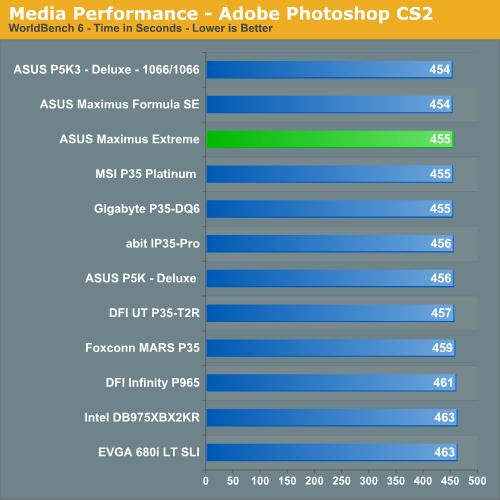
Our next test is one recommended by Intel, but the test itself appears to be fair and results are very repeatable. This test simply measures the amount of time required to fix and optimize 103 different photos weighing in at 63MB. We measure time in seconds, with lower times resulting in better performance.
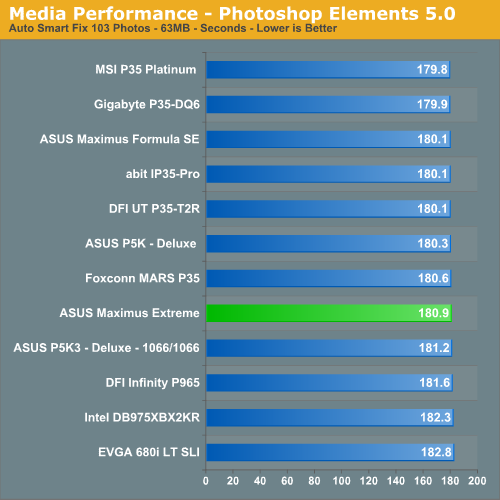
Media Encoding Performance
We are utilizing Nero Recode 2 for our video encoding test. The scores reported include the full encoding process and are in seconds, with lower numbers indicating better performance.
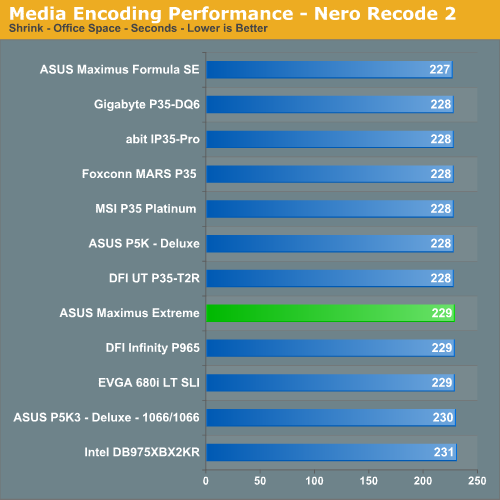
Audio Encoding Performance
We will utilize iTunes 7.4 for our audio encoding tests, as it is one of the most utilized audio applications available due to the immense popularity of the iPod. As in previous articles, we are using an INXS Greatest Hits CD for testing, which contains 16 tracks totaling 606MB of songs. We use iTunes to convert our WAV files into an ACC compatible format. We utilize the 256kbps and variable bit rate option.
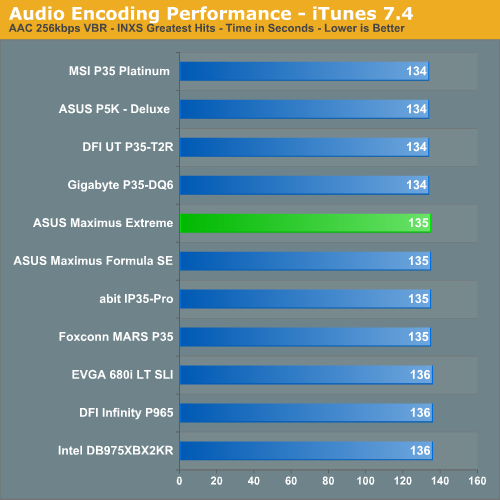
File Compression Performance
Another CPU crunching utility is WinRAR 3.70, which provides for computationally intensive file compression. Our test folder contains 444 files, 10 subfolders, and 602MB worth of data. The WinRAR test utilizes default settings and we defragments the hard drive before each test
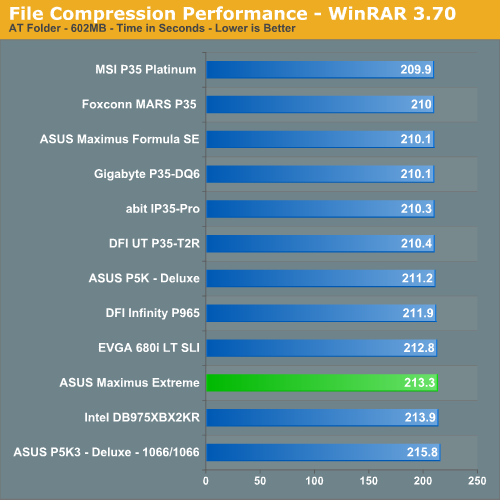
Performance Summary
Yet again, the ASUS Maximus Extreme performs well in tests that do not depend on fast CPU/memory throughput. The latency/throughput penalty with DDR3 running at 1066 speeds does come into play in our Photoshop Elements and WinRAR tests. However, the overall differences between the boards are minimal.










27 Comments
View All Comments
markglh - Sunday, January 13, 2008 - link
Does the Thermalright Ultra-120 Extremem fit ok on this motherboard in a position so that it blows air out of the case? I was worried that the fusion waterblock and the heatsink at the top of the board might be too tall.thanks.
astronaute - Wednesday, December 26, 2007 - link
Can someone explain please why in BIOS screenshots we can see FSB 400 and QX6600 FSB is more then 1000 ?Sorry if my question is stupid :)
Rajinder Gill - Sunday, December 30, 2007 - link
The BIOS screenshots shown are provided only to illustrate which BIOS functions are available for the user. They have no direct correlation whatsoever with a Q6600 or it's FSB.regards
Raja
qquizz - Thursday, December 13, 2007 - link
With a name like Maximus Extreme the board better be one bad mofo, err... i mean mobo.Zak - Monday, December 10, 2007 - link
Something's not right, C2D Extreme and 8800Ultra??? I get over 12000 in 3D Mark 2006 with a $99 Gigabyte mobo, 3GHz C2D @3.8Ghz with Tuniq Tower, 800MHz DDR2 and 8800GTX slightly overclocked.Z.
Azured - Monday, December 10, 2007 - link
No that seems allright. The test is run with a Q6600 (actually a QX6850 with a lower multiplier to simulate the Q6600) at stock 2.4GHz. considerably slower than your C2D at 3.8GHz.Zak - Monday, December 10, 2007 - link
Oh, I must have misread something then, thanks:)Z.
takumsawsherman - Monday, December 10, 2007 - link
Now this blows me away. $350 and still no Firewire800! How much money should you have to pay before you get a feature that was commercially introduced 4 years ago. Instead, you get the slower variant that first saw real action 8 years ago. What's next, USB 1.1?Maybe I didn't read the Newegg price tag correctly, but if I did, this is a travesty. And of course, no room for a PS/2 mouse port. I mean, a single PS/2 port, in a non-standard position. At first, it may seem to be no big deal, but why make it different that almost every other config? So when muscle-memory leads you blindy around the back of the case when you install a keyboard, you have to hunt around more. Not to mention that most PS/2 devices are pretty static in that people aren't switching them all the time. USB, on the other hand, is more frequently connected and disconnected. Having the PS/2 keyboard plugged in gives you limited room to change USB stuff, especially if you have another USB device plugged in. If the PS/2 port was on the bottom, you can stack a USB connector on top and still have finger room to add or remove another, without risking disconnection of another cable (PS/2 for example).
A ridiculous board, at a ridiculous price.
retrospooty - Monday, December 10, 2007 - link
not to burst your bubble but, Firewire 800 is never going to take off. Before it got started it was surpassed and totally obsoleted by eSATA. You wont ever see it as a standard feature on even high end motherboards. If you have use for it, you need to by an adaptor card for it.Etern205 - Monday, December 10, 2007 - link
Yes, eSATA is faster than Firewire 800 which is why eSATA is gaining popularity than Fire800. As for only 1 PS/2 port, if those articles or rumors are correct, then by the time ICH10 comes out we'll not see anymore PS/2 ports or PCI slots.In a question unrelated to this article, for those of you that have a usb wireless mouse or keyboard are you able to switch between the OSes if you guy have a dual or mult-boot system?
Thanks!